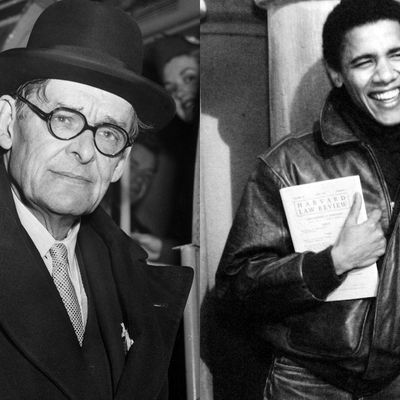
Earlier today, Intel poked a little fun at Barack Obama’s youthful love letters, which, as one of our astute commenters pointed out, read a bit like he was simply repurposing his Columbia coursework in order to correspond with his long-distance paramour. We began to wonder: What kind of grade would he have gotten for such T.S. Eliot analysis as “Eliot contains the same ecstatic vision which runs from Münzer to Yeats. However, he retains a grounding in the social reality/order of his time” and “Of course, the dichotomy he maintains is reactionary, but it’s due to a deep fatalism, not ignorance,” a reading that was admittedly done without perusing the footnotes? We checked in with some current members of the Columbia English department.
Matthew Hart, who specializes in 20th- and 21st-century Anglophone culture with an emphasis on modernist poetry, was not terribly blown away, as he wrote in an e-mail.
Considered as homework, I’d give the future President a B-minus. The reference to “an ecstatic vision which runs from Münzer to Yeats” (besides confusing that and which) sounds impressive, but it’s more than a little opaque. I assume the first reference is to the 16th-century Anabaptist leader, Thomas Müntzer, and that Mr. Obama is trying to suggest that Eliot, like Yeats, didn’t give up on the possibility of revelation. But the allusion is forced and the connection specious. You get this a lot when students try too hard. Still, I think that’s the point here. This isn’t so much literary criticism as flirtation. He’s performing the role of young intellectual.
Mr. Obama’s grade suffers still further with awful phrases such as “he accedes to maintaining a separation.” Classic undergraduatese. He’s not wrong, though, that The Waste Land is very interested in themes of desire and sterility. There’s nothing groundbreaking about these remarks, but they’re hardly risible. And he’s quite right that Eliot eventually moves towards a form of cultural conservatism that tries to retain “a grounding in the social reality/order of his time.” Again, Eliot 101 stuff, but he seems to have paid attention in class.
The best part is at the end, when he asks: “don’t you share this ambivalence yourself, Alex?” Which is to say: “Aren’t you also torn between ‘asexual purity and brutal sexual reality’? You should come join me in the middle.” This is what the letter’s really about. It takes a certain amount of chutzpah to use The Waste Land as a come-on. He gets a B+ for that.
But, at the risk of seeming gender essentialist (yeah, we still have some academese tucked away in our own back pocket), Intel wondered: Would a female professor grade Obama’s efforts any differently? We polled his colleague Sarah Cole, who just finished teaching a course on The Waste Land.
In these brief musings, President Obama shows himself to be a sensitive reader of Eliot’s great poem The Waste Land. There are really two ways to read the poem: emphatically and dogmatically, or with subtlety and generosity. President Obama reads in the second category, seeing the poem for what it is, an acutely self-divided work, which yearns for purification and order even as it creates its beauties and harmonies out of the chaos, waste, fragmentariness and litter Eliot associates with the modern world. Obama is certainly right to see in the poem a conjunction of ancient and inherited motifs with a mooring in the modern world.
Of all the topics on which the poem is divided, Obama selects perhaps the most central, overriding one: what he calls “fertility and death.” He is referring to the poem’s overarching principle, which Eliot had picked up in part from several famous anthropologists of his day, that life follows death, flowers bloom from dead land, after winter comes spring, after drought rain; out of these seasonal images, as Obama recognizes, we can generalize something about human experience: that the harshest, ugliest, most trying and most violent experiences generate beauty, accomplishment, and dignity. Obama is responding in personal terms to a poem that, despite its heavy literary apparatus (which Obama admits to having avoided) and its universalizing themes, nevertheless consists of many shorter sequences, even single lines, that invite a more emotional or personal response. … It is a poem of local brilliance and intensities, to which Obama responds with appropriate personal intensity.
On the political commentary, I will only say that, though I was pleased to see him distance himself from the famously fascist leanings of some of Eliot’s peers and friends, I was surprised to find him admiring Eliot’s own conservatism (Eliot described himself as a classicist in literature, a royalist in politics, and an Anglican in religion). I guess it shows the power of great poetry to have some sway in the real world.
In sum, though I cannot grade such a short piece, I would praise it for its insights and sensitivity, would encourage the president to develop his ideas with close reading, and would, of course, require a thorough look at those footnotes.
There you have it. Obama might not have done groundbreaking literary analysis, but his undergraduate prose managed to convince at least a couple of discerning women of his “insight and sensitivity” — and while the president is taken on the romantic front and out of academia for the time being, women are a key demographic in the 2012 election.
Previously: Barack Obama’s Old Girlfriends Get Dishy





























